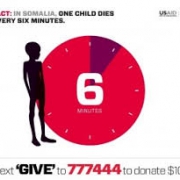Gender, Humanitarian Workers and the Drought in the Horn of Africa
Two different e-learning courses on gender-based violence awareness and policy are now available for humanitarian workers thanks to the WHO, and the UNFPA and World Education Inc. The course is particularly relevant for areas with strong gender roles, like the Horn of Africa.
The present crisis in the Horn of Africa has shifted the attention of development workers in the region to food security. Education, healthcare, and even shelter are after-thoughts for now. Particular cultural distinctions, including gender roles in the region, remain unknown to many humanitarian workers, as they are too busy focusing on in-the-moment food needs. However, the experience of humanitarian agencies helping with the natural disaster in Haiti was that gender-based violence (GBV) only increased during the crisis, leading the Inter-American Commission on Human Rights to issue recommendations to refugee camps regarding privacy, claims of domestic violence, etc.
In the Horn of Africa, particular gender issues are important to take into account, especially during humanitarian crisis. Genital mutilation and domestic violence are both relevant issues, and so is the overall role of women as primary caretakers of children.
Though humanitarian workers have experience working with people of all sorts of backgrounds since they are deployed to different regions around the globe throughout their career, they often come into a new situation with relatively little knowledge about the local customs and challenges. Such is the case for many in the Horn of Africa right now. The best way for them to prepare for these cultural challenges before they even know where they are going to be posted next, is through awareness courses.
In order to educate humanitarian workers worldwide, the UNFPA and World Education Inc partnered to produce a new e-learning course on GBV. The e-learning nature of the course makes it possible for workers to participate in the course remotely anywhere in the world and at any time.
The WHO has also created their own e-learning course in 2010 entitled “Different Needs—Equal Opportunities: Increasing Effectiveness of Humanitarian Action for Women, Girls, Boys, and Men.” The course helps humanitarian workers consider how gender factors into their humanitarian programs. In a sense, it gives the worker a list of checks to evaluate how their program will impact both women and men differently, and how to guard against possible discriminations. To watch a trailer for the course, click here.
Both of these e-learning courses are quality options for humanitarian workers. They will be better equipped to handle those tough gender issues after receiving this education via the Internet. What is pertinent in addition to taking the course, however, is applying the lessons learned and being held accountable. This is an aspect of education where e-learning lacks, and for now, it will be simply up to senior humanitarian officials to hold their workers responsible for doing this course and applying the principles taught.








































